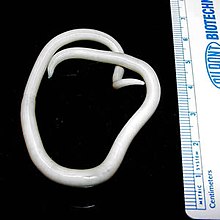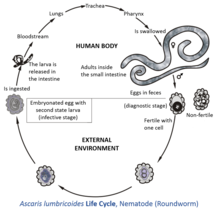
Back أسكارس Arabic اسكارس ARZ Ascaris Byelorussian অ্যাস্কারিস Bengali/Bangla Ascaris Catalan Ascaris Czech Spolorm Danish Ascaris German Ascaris Esperanto Ascaris Spanish
| Ascaris | |
|---|---|

| |
| Adult female | |

| |
| Life cycle inside and outside of the human body of one fairly well described helminth: Ascaris lumbricoides | |
| Scientific classification | |
| Domain: | Eukaryota |
| Kingdom: | Animalia |
| Phylum: | Nematoda |
| Class: | Chromadorea |
| Order: | Ascaridida |
| Family: | Ascarididae |
| Genus: | Ascaris Linnaeus, 1758 |
| Species | |
| |
Ascaris is a nematode genus of parasitic worms known as the "small intestinal roundworms", which is a type of parasitic worm.[1] One species, Ascaris lumbricoides, affects humans and causes the disease ascariasis. Another species, Ascaris suum, typically infects pigs. Other ascarid genera infect other animals, such as Parascaris equorum, the equine roundworm, and Toxocara and Toxascaris, which infect dogs and cats.
Their eggs are deposited in feces and soil. Plants with the eggs on them infect any organism that consumes them.[2] A. lumbricoides is the largest intestinal roundworm and is the most common helminth infection of humans worldwide. Infestation can cause morbidity by compromising nutritional status,[3] affecting cognitive processes,[4] inducing tissue reactions such as granuloma to larval stages, and by causing intestinal obstruction, which can be fatal.
- ^ Carter, Burton J. Bogitsh, Clint E. (2013). Human parasitology, Chapter 16: Intestinal nematodes (4th ed.). Amsterdam: Academic Press. p. 291. ISBN 978-0-12-415915-0. Retrieved 19 November 2015.
{{cite book}}: CS1 maint: multiple names: authors list (link) - ^ "Parasites-Ascariasis". Centers for Disease Control and Prevention. Retrieved 30 May 2013.
- ^ Hall, Andrew; Hewitt, Gillian; Tuffrey, Veronica; de Silva, Nilanthi (April 2008). "A review and meta-analysis of the impact of intestinal worms on child growth and nutrition". Maternal & Child Nutrition. 4 (Suppl. 1): 118–236. doi:10.1111/j.1740-8709.2007.00127.x. PMC 6860651. PMID 18289159.
- ^ Jardim-Botelho, A; Raff, S; Rodrigues Rde, A; Hoffman, HJ; Diemert, DJ; Corrêa-Oliveira, R; Bethony, JM; Gazzinelli, MF (2008). "Hookworm, Ascaris lumbricoides infection and polyparasitism associated with poor cognitive performance in Brazilian schoolchildren". Tropical Medicine and International Health. 13 (8): 994–1004. doi:10.1111/j.1365-3156.2008.02103.x. PMID 18627581. S2CID 27755528.